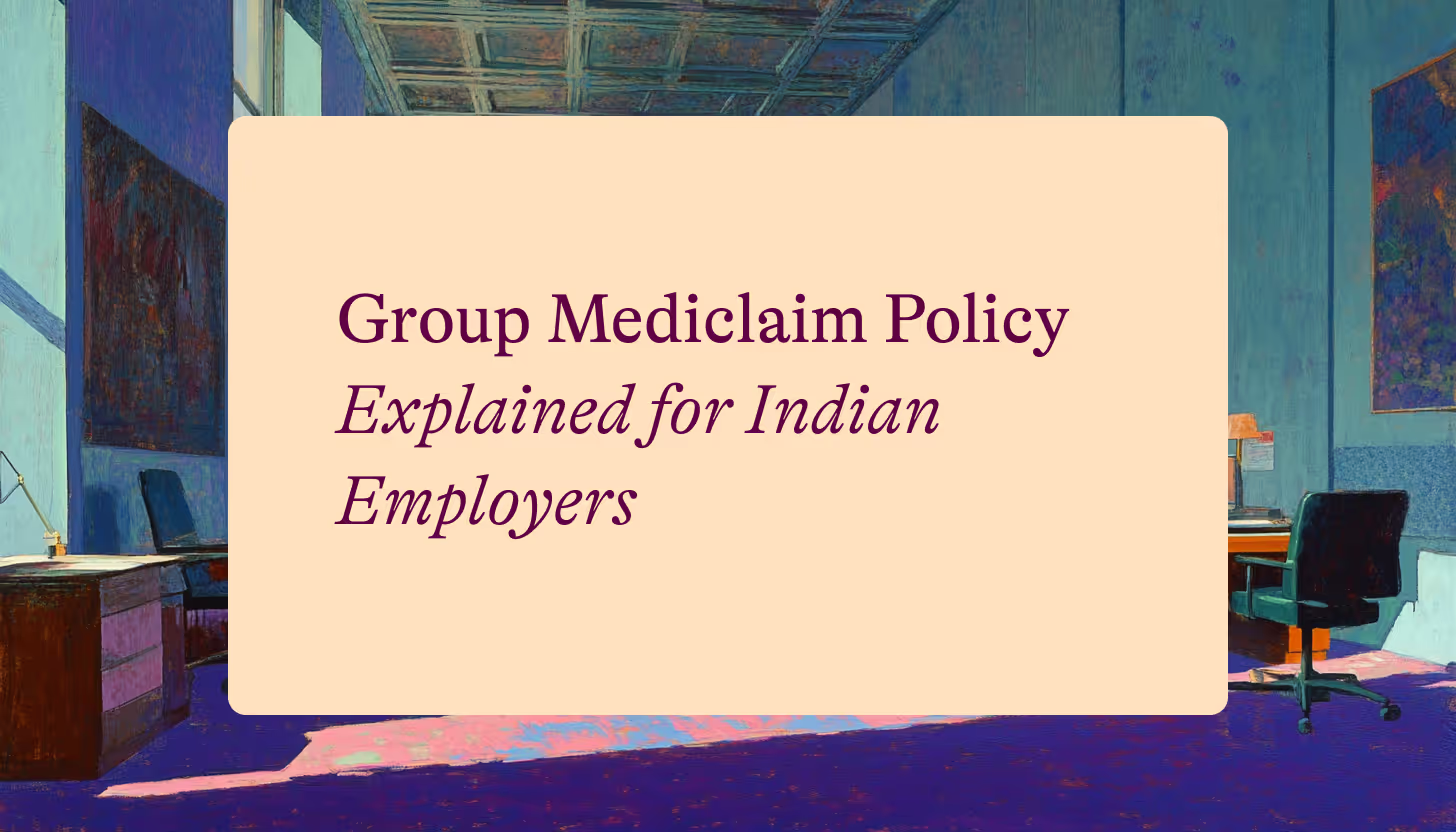GMC policy
In India, when teams say GMC policy, they usually mean a Group Mediclaim health-insurance plan purchased by the employer for employees (and often their dependants). It’s the backbone of the benefits stack: hospitalisation gets paid cashless at network hospitals, out-of-network care can be reimbursed, and add-ons like maternity or parental cover can be built in. Done well, GMC stabilises productivity, reduces financial shocks for families, and signals that the organisation thinks long-term. This guide explains how a GMC policy works, which levers actually matter, what the regulator expects, and how to communicate the benefit so employees understand it before they ever need it.
What a GMC policy covers – and how it differs from other policies
A Group Mediclaim policy pays medical expenses for covered treatments when an employee (or covered dependant) is hospitalised or undergoes a listed day-care procedure. It is not life insurance (that’s group term life) and not accident-only cover (that’s GPA). The policy is a contract between the employer and the insurer under a single master number; employees are enrolled as members. IRDAI’s health-insurance rules and standardisation guidelines set the broad guardrails (definitions, exclusions that are allowed or disallowed, and disclosure standards), while employers and insurers decide the exact sums insured, waiting periods, and sub-limits for the group.
In practice, benefits are delivered in two ways. Cashless care means the hospital bills the insurer (or its TPA) directly; reimbursement means the employee pays first, then files documents for repayment. Both are legitimate paths; cashless is easier at in-network hospitals, while reimbursement gives flexibility if a preferred hospital isn’t on the network.
GMC Policy Benefits
Read More: Group Accident Insurance
{{finding-right-ghi="/web-library/components"}}
What is covered in a GMC policy?
Here is a standard list of inclusions under GMC insurance.
- In-patient hospitalisation: room/boarding, nursing, ICU/OT charges, surgeons’ and specialists’ fees, diagnostics, medicines, implants.
- Day-care treatments that don’t require 24-hour stays (enabled by tech/modern procedures).
- Pre- and post-hospitalisation expenses for the same illness/injury, for the period defined in your schedule.
- Cashless treatment at network hospitals (with “cashless facility” defined in policy wordings).
- AYUSH hospitalisation (Ayurveda, Yoga & Naturopathy, Unani, Siddha, Homeopathy) in registered facilities if your insurance provider includes it in your cover.
- Ambulance charges for emergency transport, up to policy-specified limits.
- Domiciliary hospitalisation (home treatment when hospitalisation isn’t possible), if opted and within stated caps.
- Organ donor expenses related to harvesting for the insured person, as per policy wording.
Common optional add-ons (if purchased):
- Maternity benefit and newborn cover from day one (with separate limits/waiting periods).
- Corporate buffer / restoration of sum insured, OPD or wellness/health check-up benefits, and home healthcare services.
Inclusions refer to all such cases, incidents, instances, conditions, ailments, and more covered under your group insurance scheme.
Check out: Group Term Life Insurance
{{abc-of-ghi="/web-library/components"}}
What is not covered in GMC policy?
Here is a typical list of exclusions under GMC insurance. As an employee, always ask your human resources manager to tell you about the policy details, terms and conditions right when you join the company.
Note: The above set of inclusions and exclusions are standard. Different insurance groups and policymakers have their respective terms and conditions concerning the points mentioned above. So do not forget to read the policy document before buying a comprehensive group insurance plan.
FAQ
Q. How does the coverage for parents-in-law work, and are there any additional costs or limitations compared to coverage for immediate family members?
A. Coverage for parents-in-law in a GMC policy often mirrors that for immediate family members. However, it may come with extra costs or limitations. Insurance providers set terms based on risk assessments. Therefore, including parents-in-law might increase premiums due to their age or health. Policies vary, so check with your employer or the insurance provider. They will clarify any differences in coverage or additional costs for including parents-in-law.
Q. What specific riders can be added to a GMC policy, and how do these affect the overall cost and benefits of the policy?
A. Riders enhance a GMC policy by offering additional benefits like dental care, vision care, and wellness programs. Each rider comes at an extra cost, impacting the policy's overall price. However, they provide tailored coverage, meeting diverse needs. For instance, a dental rider covers treatments not included in the base policy. Choosing riders depends on individual or family health needs, balancing extra costs against potential benefits. Consult your HR department or insurance provider to understand the options and their impact on premiums.
Q. How are pre-existing diseases handled under a GMC policy, specifically regarding the waiting period and any exclusions?
A. Pre-existing diseases in a GMC policy are subject to waiting periods before coverage kicks in. These periods vary, typically ranging from a few months to years. The specifics depend on the insurer's policies and the employer's plan. Some conditions may be permanently excluded or have specific terms for coverage. It's important to review the policy document or consult HR for details. Knowing these terms helps manage expectations and plan healthcare expenses.
.avif)










.avif)














